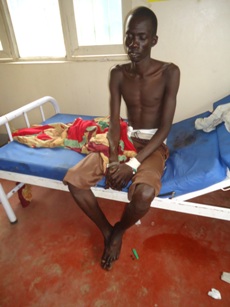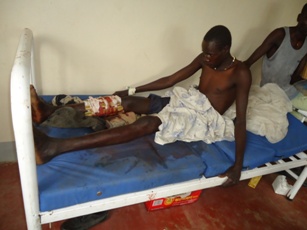Cattle raids kill 10 as Unity and Lakes exchange accusations and denials
December 7, 2012 (PAYINJIAR & RUMBEK) – Officials from South Sudan’s Unity and Lakes have accused youth from the other’s states of raiding cattle and killing local people. Ten people have died and 14 have been injured in cattle raids between the states between 5-6 December.

Commissioner Peter Gai Joak condemned the deadly attack and alleged that the attackers had come from Rumbek Central and Rumbek North in neighbouring Lakes State.
Abraham Mayen Kuc, the Commissioner of Rumbek Central County, told Sudan Tribune on Friday that he had received a phone call from his Payinjiar counterpart regarding the raid, but said that further investigation was needed to verify who carried out the attack.
However, he said that had put his “security forces on maximum alert to intercept the return” of any raiders from Unity State, adding that “if they arrive with those cows, we must return them back by all means”.
Mayen added that on 5 December youth from Payinjiar had raided cows from the Manyang-Rel and Amonyping cattle camps, clashing with civilians and members of South Sudan’s armed forces (SPLA), killing two and injuring four people.
The Commissioners of both Rumbek Central County and Payinjiar both appealed to the South Sudanese government to bring an end cattle rustling in the 17-month-year-old country by enforcing law and order.
“Let us join hands to consider this threat as the national security issue. It should not be looked at as the problem between county to county and from state to another state alone. We need to fight cattle raiding. That needs to be prioritised and considered as [the] number one hindrance [to] development in the young nation South Sudan”, said Commissioner Joak.
The Commissioner of Rumbek East of Lakes State, David Marial Gumke, told Sudan Tribune that no youth from his county had been involved in the recent fighting.
“Completely no”, he said, “my youth of Rumbek East County had not attacked any state”. However, he repeated the allegation that youth from Payinjiar raided cattle from his state on Wednesday, only for the cows to be recovered on Thursday.
INJURED WITNESS IN PAYINJIAR
One of the survivors of the attack on Lakes State’s Payinjiar County on Thursday, Patai Kai, told Sudan Tribune that the attack was a barbaric attempt to destabilize the communities in Lakes and Unity State.

The attack, Kai told Sudan Tribune, occured at 6:30 pm with raiders firing on the whole camp, murdering two girls, a woman, a boy and six men. Kai and some other men attempted to fight back using “local spears”, he said.
Payinjiar County was disarmed in 2011 as part of the country’s policy not to allow civilians to carry arms, which have are prevalant as a consquence of decades of civil war preceeding the 2005 peace deal that allowed South Sudan to secede last year.
South Sudan’s army and police have vowed to protect communities that have been disarmed but the Payinjiar community are unhappy that they have been left exposed to such attacks from cattle rustlers.
Kai estimated that the group which attacked Payinjiar numbered more than 100, adding that some of them wore army uniforms and were armed with AK47s and PKM machine guns.
“We need police deployment to protect us from enemies. It has become a situation of tears and we wonder why South Sudanese people from Lake State attack us with no reason every day”, Kai said.
He urged the two state governments to deploy more police forces on the state border prevent further revenge attacks between the Dinka Agar of Lakes State and the Nuer-Nyuong of Payinjiar, Unity State.
Police from Payinjiar County attempted to recover the cattle after arriving at the scene 45 minutes after the raid but were unable to recapture the stolen cows. Authorities in the area claim over 200 heads of cattle were taken from Makur village.
Thursday’s raid follows raids the previous day on Lakes State, which officials there blamed on youth from bordering counties in Unity State.
However, Payinjiar’s Commissioner denied that any young men from his county had been involved in rading Lakes State. Sudan Tribune was unable to contact Commissioner Gideon Gatpan Thoar of Mayiandit County for comment on the allegations on Friday.
The Lakes-Unity-Warrap border is notoriously tense, with communities on either side reguarly accusing their neighbours of cattle raiding and other crimes. South Sudan’s administrative divisions often reflect the ethnic constituency of many areas.
Cattle raiding is a common but deadly practice in South Sudan. Young men need cattle in order to pay pride prices and cycles of violence between communities can last for months or years if reparations and reconciliation is not completed satisfactorily.
However, violence on the Lakes-Unity-Warrap axis has been dwarved in the last two years by raids and counter raids between groups in Jonglei, South Sudan’s largest state where around 2,000 people have been killed, according to the UN Mission in South Sudan.
Some have accused South Sudan’s parliament of failing to respond adequately to the scurge of cattle raiding and insecurity that is hampering the young nation’s effort to develop after decades of civil war and crippling underinvestment.
(ST)
